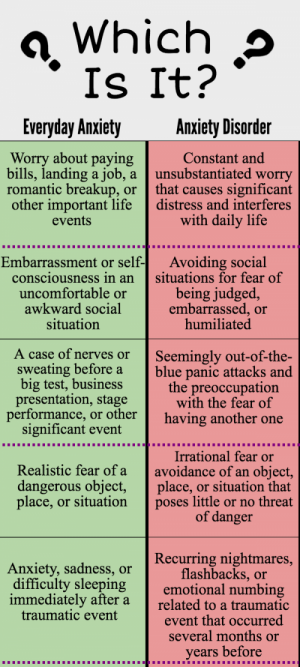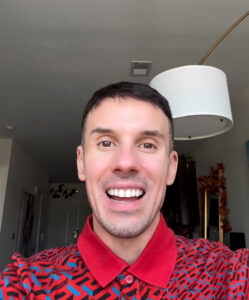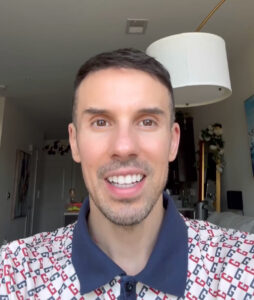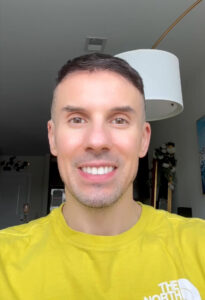Banish Anxiety in 10 Steps
“Hey you! Yeah, YOU! Stop WORRYING!”
If only it were that easy.
Let’s first determine if what you are experiencing is everyday anxiety or if it is an anxiety disorder. Take a look at the graphic below provided by the Anxiety and Depression Association of America (ADAA):

Okay, now that we’ve determined you have an anxiety disorder let’s get to work!
- Learn to recognize your symptoms. Becoming more self-aware is one of the greatest things you can do for yourself. What triggers your anxiety (e.g. crowds, the subway, traffic, social situations, etc.) ? What happens to your body when you have anxiety (e.g. palpitations, sweaty palms, shortness of breath, etc.)
- Choose YOUR best coping mechanisms and use them. Every therapist is going to tell you to take deep breaths and try to calm yourself down; I know, you’re sick of hearing it. What many therapists and doctors to fail to mention is the science behind deep breathing. Deep breathing exercises can actually REVERSE your body’s natural reaction to stressful conditions, which will help you manage negative emotions and even physical pain more effectively (read more here)! However, there are several coping mechanisms that people utilize to deal with stress. Here are a few:
- Listening to music (pick a happy song or a song from childhood that is going to make you feel better).
- Drinking a glass of water. Hydrating is not only important for reducing stress but water also has natural calming properties.
- Call a friend. Talking to someone that you have a close, trusting relationship with can be very important in times of high distress. Sometimes just the voice of someone you know and love is enough to calm you down. Plus, there’s always the other perspective.
There are MANY tools we can utilize in times of high stress/anxiety. Start thinking about what will work best for YOU!
- Examine your thoughts. This requires more than examining–WRITE them out. Find out what you are afraid of. Remember that anxiety is the result of thoughts in our heads. If we are going to restructure our thoughts we must be clear on what we’re going to change. Think of all the negative thoughts you’ve had in the past two weeks and write them down.
- Determine what your cognitive distortions are. Cognitive distortions are irrational thoughts and beliefs that our minds have developed over time. Typical ones I see in my office are “Polarized Thinking”, “Catastrophizing”, “Jumping To Conclusions” and “Personalization.” See 15 common ones here
- Challenge your thoughts. Now that you know what your thoughts are it is time to challenge them. For example, imagine your walking down a dark street and you start to feel uneasy (butterflies). Your mind is interpreting the situation as dangerous and causing you to experience the anxiety as a result. However, is there any evidence that you’re in danger? When you walk into a bar and fear that others might judge you, what evidence do you have of that? Now that you have evidence that does not support your negative thought it’s time to move to the next step.
- Create a balanced thought. Balanced Thoughts are things that you can say to yourself to help put negative, anxious or self-critical thoughts into perspective. At this point you have most certainly found evidence that does not support your negative thoughts. Take the knowledge you have gathered from the evidence that does NOT support and use that to create a more balanced thought. For example, in the example given above you might say something like “The street may be dark but there’s nothing dangerous around me and I don’t see anything suspicious, I will be fine!” or “I can’t read people’s minds so how can I say they are judging me?”
- Say NO to anxiety, take a deep breath, and think about your thinking. Anxiety doesn’t ask for consent, it just attacks. How many times will you let it violate you before you start saying no?
- Ask yourself these questions. What would a friend tell me about this situation? What would I tell a friend? Will this matter in 1 year? 5 years?
- Keep a journal or digital notes. We live in the smart age. Everyone has a smart phone, tablet, or smart watch these days. Keeping a journal or writing notes is not what it used to be. Use your notebook or app of choice and start to take notes of situations (what was happening?), thoughts regarding these, feelings (sad, happy, scared, anxious), behaviors (what did I do?), coping mechanisms (how did I calm myself down?), and what was the end result (what did I do to overcome this situation?). You will become a PRO at managing your anxiety and working through situations the more you do it!
- Use therapy Apps. You will be amazed to see just how many apps are available for Android and iOS phones. Address your anxiety on the go (situation pending). My recommendations: Mood Tools, Pacifica,and Headspace.
- Accept your anxiety. This may sound like the last thing you want to do but accepting your anxiety is actually very helpful. There is no cure for anxiety so in order to live with anxiety one must learn to accept it and practice compassion–to ourselves. Instead of expecting that your anxiety will disappear permanently and set yourself up for failure, understand that anxiety will creep up but that you have the ability to fight it when it does because you’ve fought it before and have WON. Be compassionate with yourself and accept where you are.
- Sleep. Eat. Rinse. Repeat. Adequate sleep (see sleep recommendations) is vital to our well-being and decreases our anxiety. New research suggests that sleep deprivation increases the odds that you’ll get “anticipatory anxiety”—that sense of dread you feel before a big test, presentation, or meeting with the boss. That’s because the loss of deep sleep fires up your amygdala and insular cortex, the regions of your brain responsible for emotional processing, as well as your fight or flight response. | Adequate diet is equally as important. Doctors understand that there is a clear connection between our brains and our guts. What we are putting in our body has a direct affect on our anxiety (read more). | Believe it or not but research has shown that cold showers actually can reduce our anxiety and keep us clean!
Now remember you cannot banish your anxiety for good but if you work at it you can become a master at keeping it from taking control of your life. I hope that the information laid out above helps and I welcome your thoughts, comments, and questions.
“Sometimes we live our lives in chains and never even know we have the keys.”








